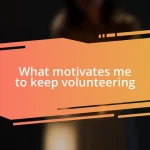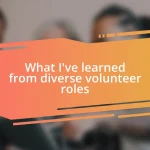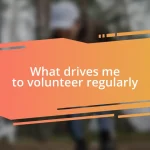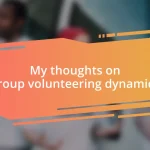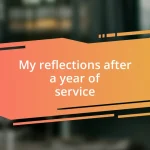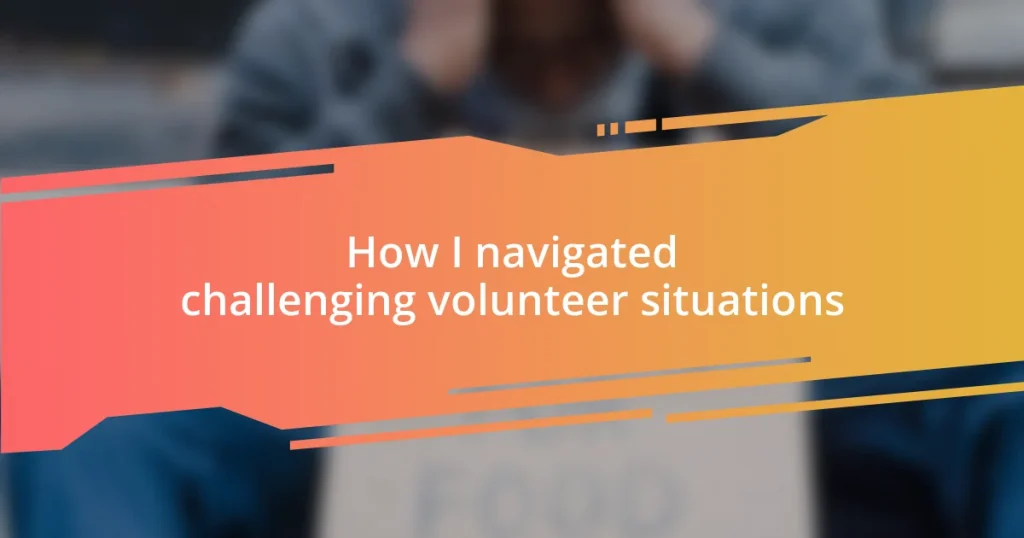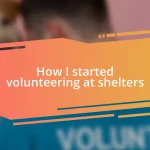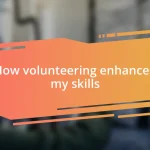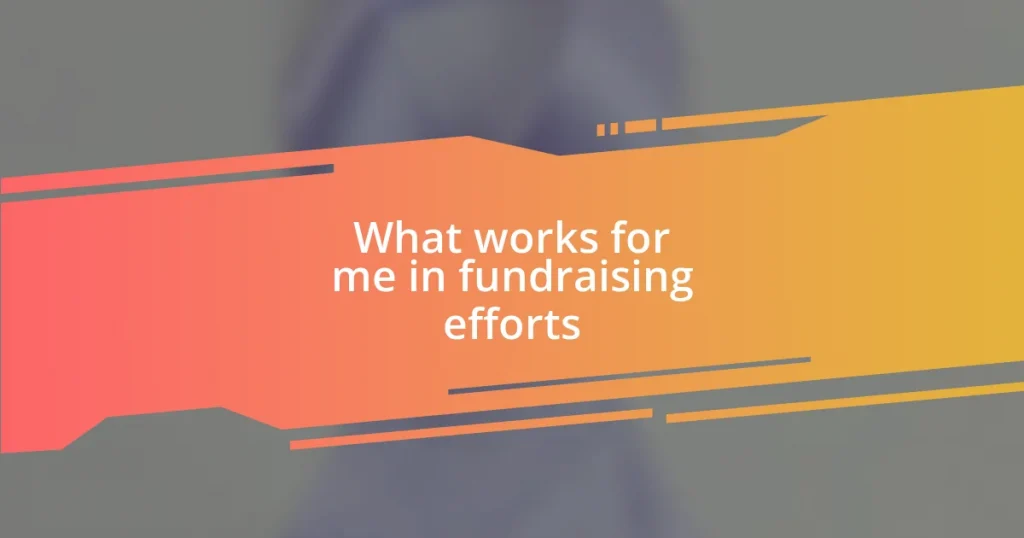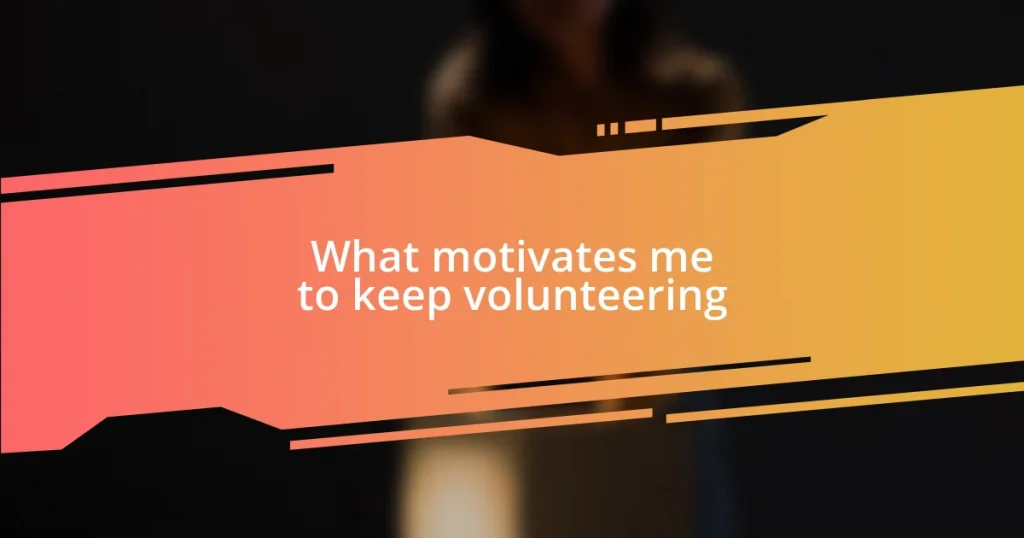Key takeaways:
- Effective communication and emotional intelligence are crucial for resolving conflicts and fostering teamwork in volunteer situations.
- Involving other volunteers in decision-making promotes ownership, creativity, and strengthens relationships within the team.
- Reflecting on experiences and being adaptable leads to valuable lessons that enhance future volunteer efforts and collaboration.
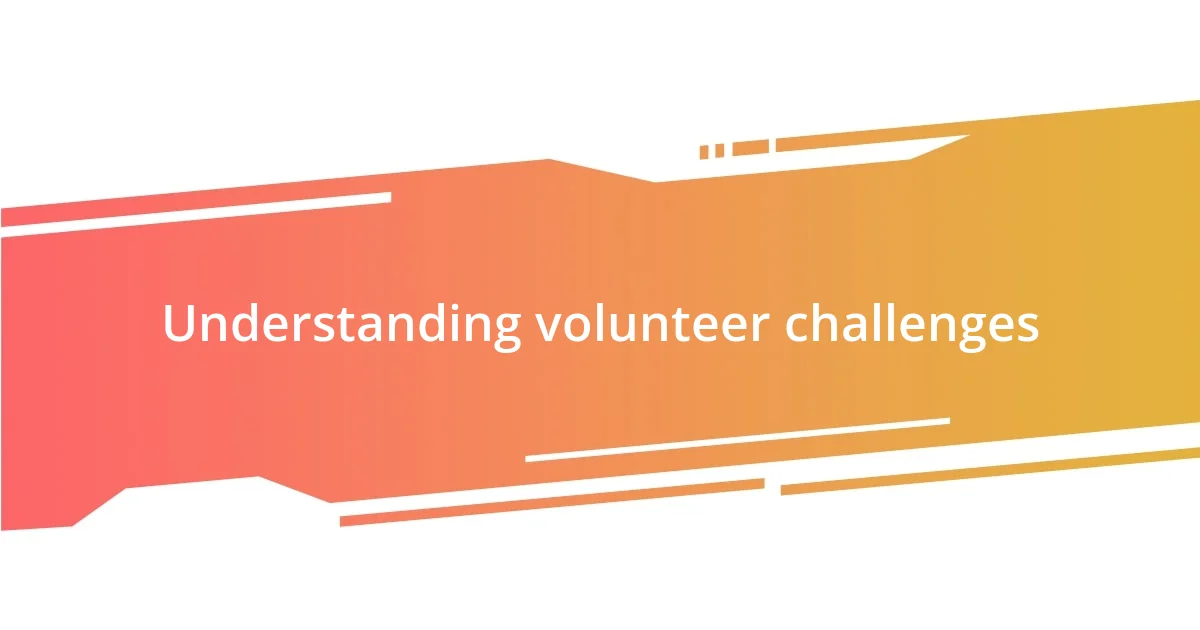
Understanding volunteer challenges
Volunteering can be a deeply rewarding experience, but it doesn’t come without its challenges. I remember a time when I joined a community project that promised to unite people. Yet, it quickly became clear that differing opinions and personalities could lead to conflict. Have you ever found yourself in a situation where the passion for the cause clashed with the volunteers’ dynamics? It can be eye-opening.
One of the biggest hurdles I’ve faced involved communication breakdowns within the team. We all had good intentions, but when instructions got lost in translation, chaos often followed. I distinctly recall a day when a miscommunication led to us showing up at the wrong location, and it made me question: how often do we overlook the foundational element of teamwork—clear communication?
Emotional fatigue is another subtle yet significant challenge I’ve encountered as a volunteer. There were moments when the weight of the work, especially dealing with sensitive community issues, felt overwhelming. I realized that caring deeply for the cause can sometimes lead to burnout. How do we balance our desire to make an impact with the need for self-care in such demanding environments?
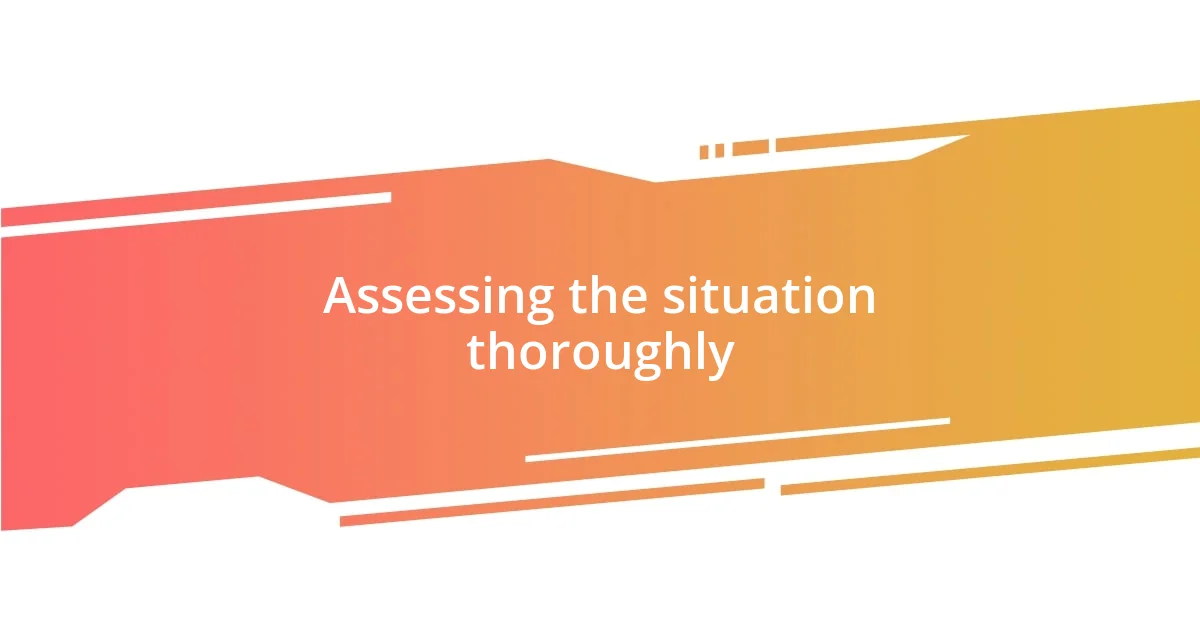
Assessing the situation thoroughly
When navigating challenging volunteer situations, taking a step back to assess what’s happening is vital. It’s easy to get caught up in the heat of the moment, especially during conflicts or confusion within the team. I remember a specific instance when tensions flared over task responsibilities, and before we knew it, frustration ran high. In that moment, I learned the importance of understanding each person’s perspective and taking a moment to breathe before reacting.
To assess the situation thoroughly, I suggest focusing on these key aspects:
– Identify the Source of Tension: Understand root causes by asking questions.
– Observe Interactions: Pay attention to how team members communicate with one another.
– Consider Emotions: Recognize the feelings that may be driving behaviors, both yours and theirs.
– Gather Input: Talk to others to get their insights without jumping to conclusions.
– Prioritize Clarity: Ensure that everyone understands their roles and responsibilities.
Taking this thoughtful approach can transform chaos into collaboration.
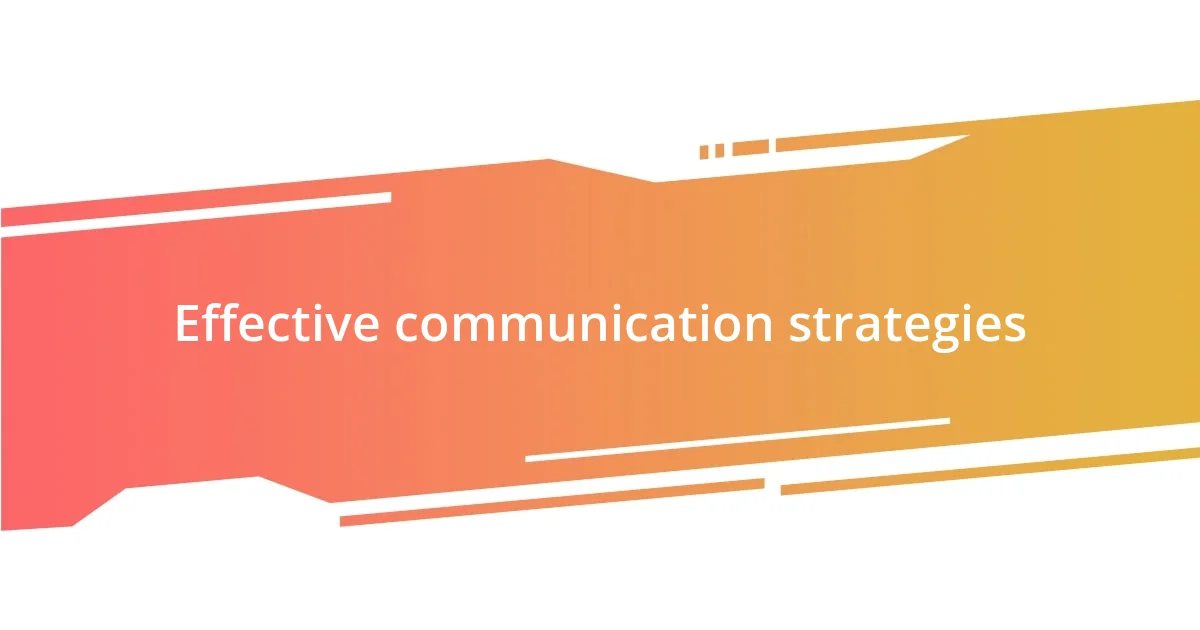
Effective communication strategies
Effective communication strategies are pivotal in navigating challenging situations during volunteering. I’ve found that openly expressing thoughts and feelings can create a supportive atmosphere. For example, during a fundraising event, I noticed that when I shared my anxieties about meeting our goals, others began to open up too. Have you ever noticed how vulnerability can humanize the experience? It’s amazing how quickly a team can bond when everyone feels heard and understood.
Another strategy I’ve adopted is active listening. Once, while volunteering for a community cleanup, two volunteers were in a heated disagreement about the best approach. Instead of allowing the situation to escalate, I stepped in and encouraged each to share their viewpoint. I practiced reflective listening, where I would paraphrase their points to show that I understood them. This tactic not only diffused the tension but also helped them find common ground. It’s a reminder that sometimes, simply feeling acknowledged can turn conflict into collaboration.
Regular check-ins with team members have proven valuable too. I recall a project where burnout was palpable among the volunteers. By initiating brief, casual catch-ups after our shifts, we created a platform for sharing struggles and celebrating successes. I realized that fostering an environment of open dialogue can sustain motivation and strengthen relationships. Are you implementing regular feedback loops in your volunteer roles? If not, it might just be the key to a happier, more engaged team.
| Strategy | Description |
|---|---|
| Open Expression | Sharing thoughts and feelings fosters a supportive team environment. |
| Active Listening | Encouraging dialogue and reflecting others’ viewpoints helps diffuse tension. |
| Regular Check-ins | Brief catch-ups create a platform for feedback and morale boosting. |
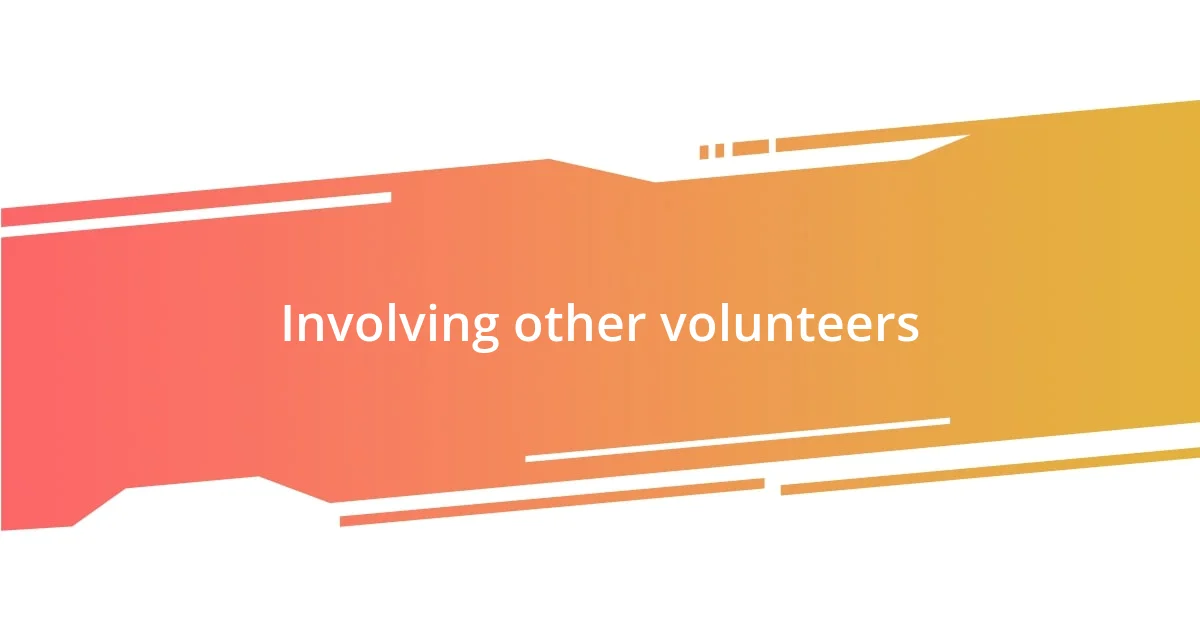
Involving other volunteers
Involving other volunteers can be a game-changer in challenging situations. I recall a time when a project stalled due to miscommunication and frustration took hold. Instead of shouldering the burden alone, I invited several volunteers to gather for a brainstorming session. This simple act of inclusion not only lightened my load but also sparked creativity and re-energized the team. Have you ever felt the weight of a problem start to lift when you share it with others? The power of collaboration can’t be overstated.
When I engage fellow volunteers, I always aim to create a sense of ownership among the group. During one particularly demanding outreach event, instead of assigning tasks blindly, I asked each person what they felt passionate about. It was incredible to see how their eyes lit up when they could choose their role. This approach transformed enthusiasm into productivity and made everyone feel essential to the mission. Isn’t it amazing how a little empowerment can turn a mundane task into a memorable experience?
Moreover, rallying volunteers to discuss their ideas and solutions can foster trust and camaraderie. I remember leading a debrief after a complicated event where a few hiccups occurred. I opened the floor for feedback, and to my surprise, many shared their thoughts candidly. Their shared experiences not only healed our frustrations but also built a stronger bond among us. Have you considered how valuable peer insights can be? Inviting others into the conversation creates a rich tapestry of perspectives that can illuminate the way forward.
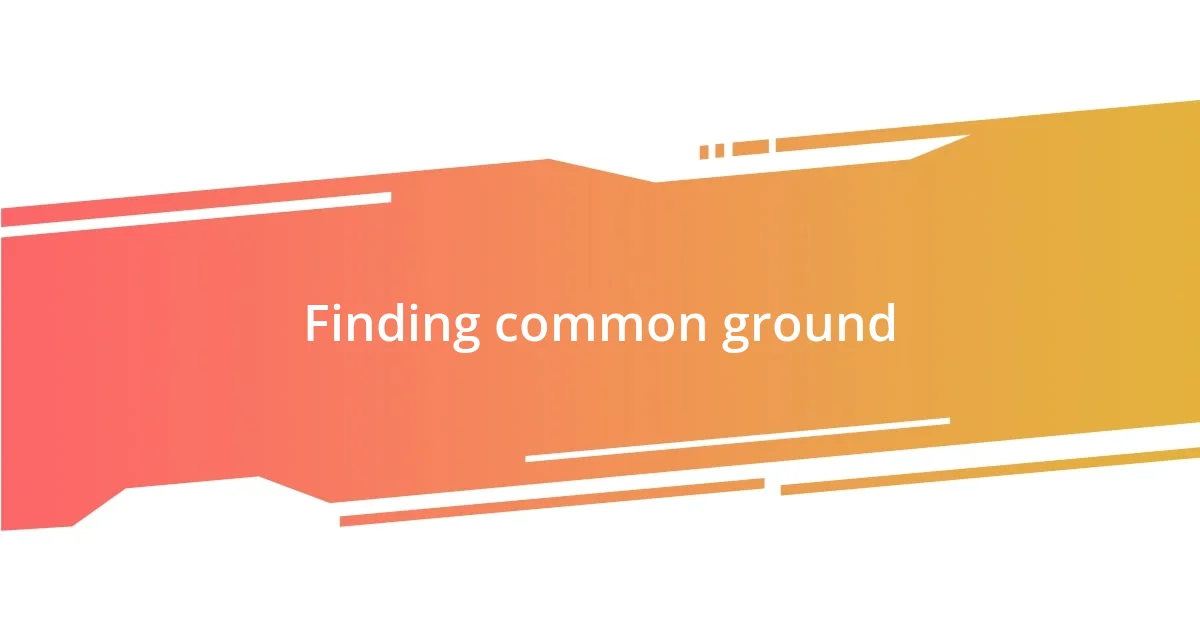
Finding common ground
Finding common ground is essential for nurturing successful volunteer relationships. I’ve often found myself in situations where opinions differ dramatically, like during a planning session for a community garden project. Instead of letting tensions rise, I initiated a round-table discussion, encouraging everyone to share what aspects were most important to them regarding the garden’s design. It was astonishing to witness how understanding each other’s priorities fostered compromise, resulting in a design that truly reflected our collective vision.
Once, while organizing a charity event, two volunteers butted heads over the target audience. It was stressful, and honestly, I felt the weight of that disagreement in the air. To address this, I proposed a casual brainstorming session over coffee. This informal setting allowed everyone to voice their opinions freely, and soon enough, we uncovered overlapping interests. By shifting the focus from opposing views to shared objectives, we not only resolved the conflict but also reignited our enthusiasm for the event. Have you ever realized how a simple change of environment can shift perspectives and ease tensions?
Encouraging empathy among team members also plays a huge role in finding common ground. During a volunteering stint with a local shelter, I saw two colleagues clash over responsibilities one evening. Instead of letting this spiral, I suggested a team-building game to lighten the mood. As we played, laughter emerged, and barriers began to dissolve. The game reinforced our shared mission and, by the end, I noticed how much kinder and understanding they were toward each other. It struck me then—the strong connections formed in a lighthearted setting can transform conflict into collaboration.
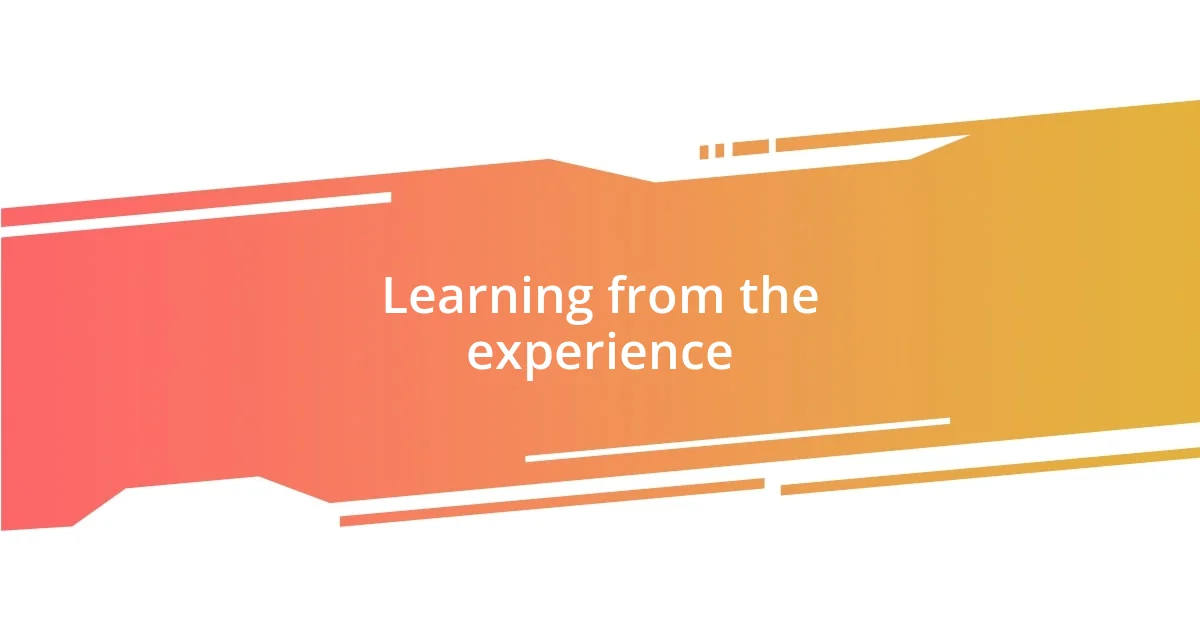
Learning from the experience
It’s incredible how every challenging volunteer situation becomes a profound learning experience. I remember a day filled with chaos during a food drive when things didn’t go as planned. Instead of succumbing to frustration, I took a step back and reflected on the mishaps during our debrief later. Analyzing what went wrong highlighted gaps in our communication and helped us tweak our strategy for the next event. Have you ever found that reflecting on setbacks often lays the groundwork for future success?
Sometimes, it’s in the quieter moments that the biggest lessons surface. After we completed a challenging outreach campaign, I decided to end our team meeting sharing a little bit about my own struggles. I noticed how this vulnerability encouraged others to share their experiences. It dawned on me then—transparency isn’t just about admitting mistakes; it fosters deeper connections and supports a culture of learning. How often do you think teams miss out on these breakthroughs because they shy away from openness?
As I navigated different situations, I learned the importance of flexibility. During a weekend cleanup, unexpected weather forced us to change our plans quickly. Instead of sticking rigidly to the original agenda, we came together to brainstorm alternative activities. The shift not only salvaged the day but also ignited a wave of creativity that led to some truly memorable moments. It made me realize that being adaptable can turn potential setbacks into opportunities for innovation. Have you noticed how embracing change can open doors you never thought possible?
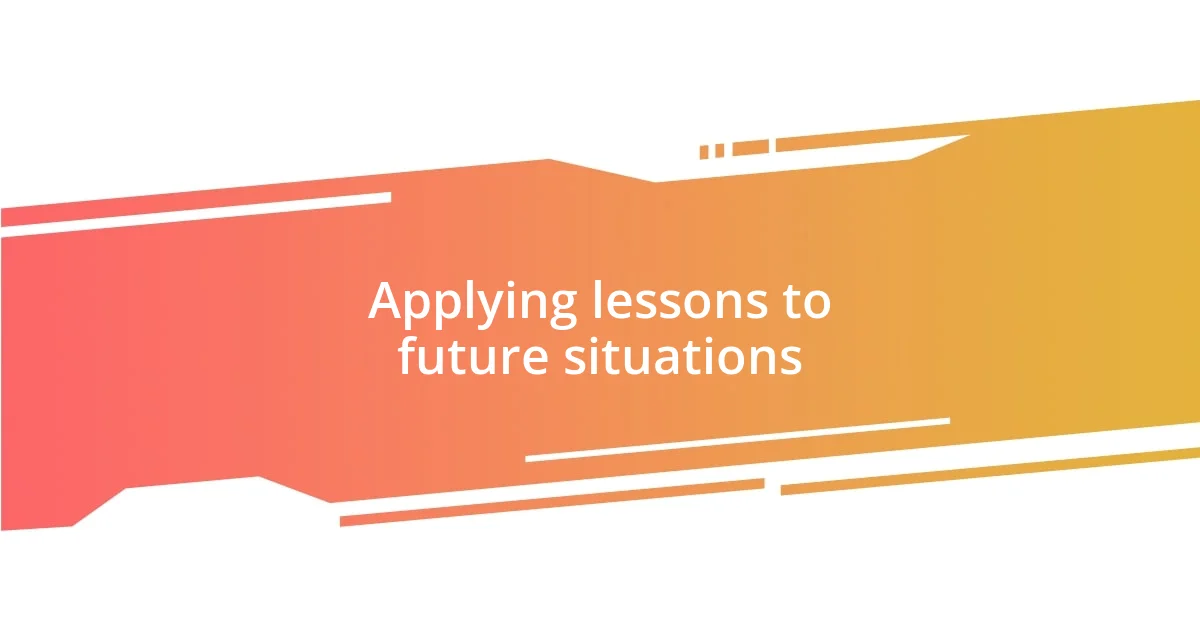
Applying lessons to future situations
I’ve come to appreciate that each challenging situation I faced in volunteering has equipped me with distinct tools for the future. For instance, during a chaotic bake sale, I learned that over-preparing for unforeseen complications can really save the day. I’ll never forget how a sudden shortage of supplies left us scrambling, but the experience taught me to always have a contingency plan. Have you ever found that being proactive can transform potential disasters into manageable challenges?
Reflecting on emotional intelligence has also reshaped my approach in subsequent volunteer roles. One time, I encountered a volunteer who was visibly upset about a task that didn’t align with her skills. Instead of overlooking her feelings, I took a moment to chat with her, and it opened my eyes to the importance of emotional check-ins. That simple conversation not only lifted her spirits but inspired me to prioritize emotional well-being in my teams moving forward. Have you ever realized how tuning into other’s emotions can lead to more cohesive teamwork?
Moreover, I believe building rapport creates a strong foundation for navigating difficulties. During a health fair, I noticed that the volunteers were hesitant to ask for help, which created unnecessary tension. So, I shared a story about a time I felt overwhelmed and encouraged them to lean on one another. That moment resonated, and it instantly broke the ice. It became clear to me that fostering a sense of community helps us tackle challenges together, rather than in isolation. What would happen if we all opted for connection over competition?


